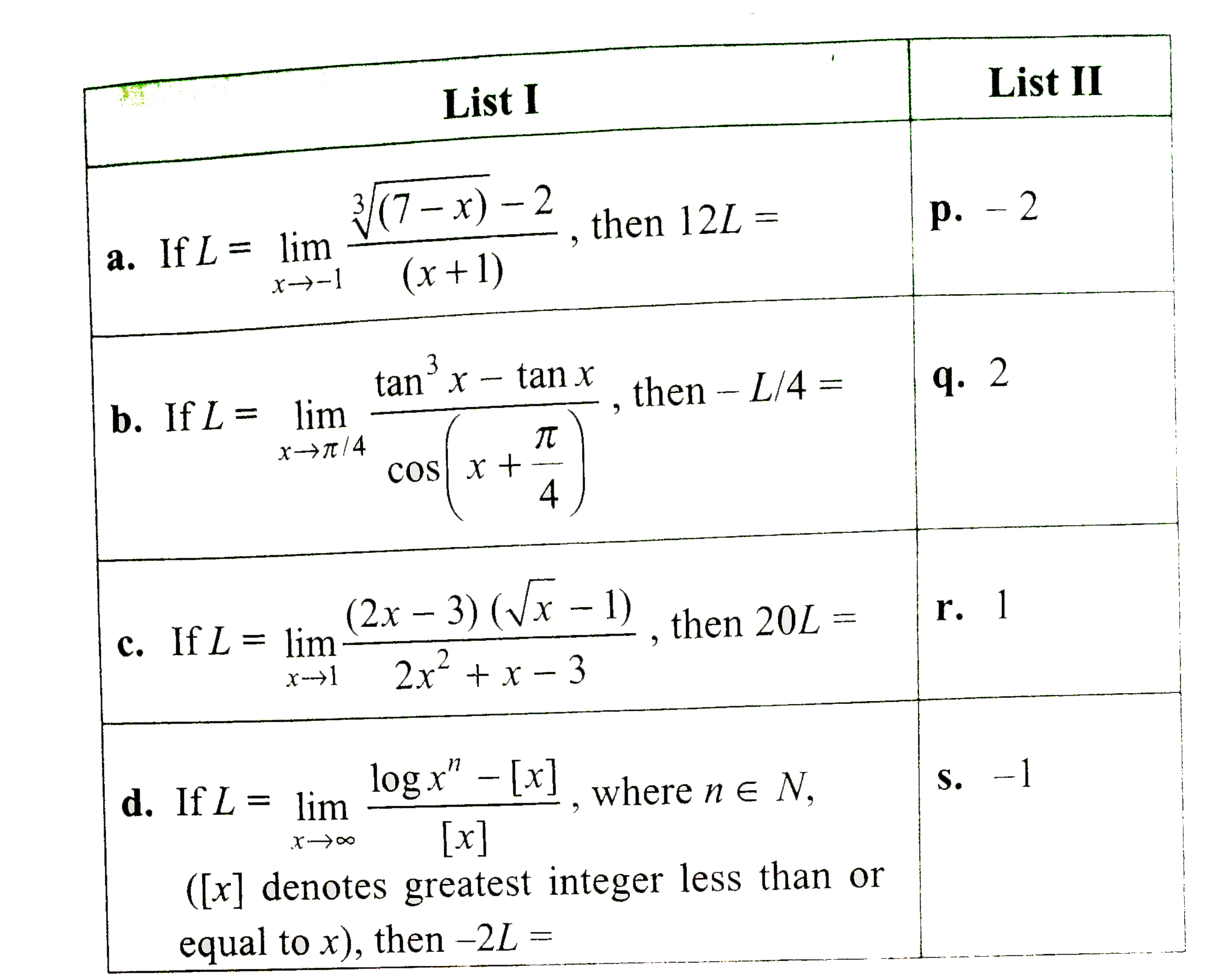The integer n for which (lim)x→0((cosx−1)cosx−eˆxxn is finite nonzero number is ________Solution in Tamil
The correct Answer is:(3)
L=limx→0(cosx−1)(cosx−ex)(1+cosx)xn
=limx→0(sinxx)2(1−cosxx+ex−1x)xn−311+cosx
If L is finite nonzero, then n=3 (as for n=1,2,L=0, and for n=4,L=∞.)
Topper's Solved these Questions
- BOOK - CENGAGECHAPTER - LIMITSEXERCISE - JEE Main Previous Year8videos
LIMITS
- BOOK - CENGAGECHAPTER - LIMITSEXERCISE - JEE Advanced Previous Year7videos
LIMITS
- BOOK - CENGAGECHAPTER - LIMITSEXERCISE - Exercise (Matrix)5videos
LIMITS
- BOOK - CENGAGECHAPTER - JEE 2019EXERCISE - Chapter 109videos
JEE 2019
- BOOK - CENGAGECHAPTER - LINEAR COMBINATION OF VECTORS, DEPENDENT AND INDEPENDENT VECTORSEXERCISE - DPP 1.210videos
LINEAR COMBINATION OF VECTORS, DEPENDENT AND INDEPENDENT VECTORS
Similar Questions
Let f:R→R be a positive, increasing function with
limx→∞f(3x)f(x)=1. Then limx→∞f(2x)f(x) is equal to04:10View SolutionIf limx→0[1+xln(1+b2)]1/x=2bsin2θ,b>0, and θ∈(−π,π], then the value of θ is
03:55View SolutionMatch the following lists:
 03:38View Solution
03:38View SolutionIf y = y(x) is the solution of the differential equation, xdydx+2y=x2 satisfying y(1) = 1, then y(12) is equal to
05:06View SolutionThe number of integral values of p for which (p+1)ˆi−3ˆj+pˆk,pˆi+(p+1)ˆj−3ˆk and −3ˆi+pˆj+(p+1)ˆk are linearly dependent vectors is q
03:32View SolutionThe integer n for which limx→0(cosx−1)(cosx−ex)xn is finite nonzero number is ________
05:06View SolutionWhich of the following limits tends to unity? (a)(lim)x→0sin(tanx)sinx (b) (lim)x→π2sin(cosx)cosx (lim)x→0sinex−1x (d) (lim)x→0√1+x−√1−xx
06:54View SolutionThe integer n for which the
limx→0cos2x−cosx−excosx+ex−x32xn is a finite non-zero number is05:29View Solutionपूर्णांक n, जिसके लिए limx→0(cosx−1)(cosx−ex)x, एक परिमित अशून्य संख्या है :
05:25View SolutionThe integer 'n' is for which Ltx→0(cosx−1)(cosx−ex)xn is a finite non zero numberis
03:18View Solutioninteger n for which lim_(x to 0)((cosx-1)(cosx-e^(x)))/(x^(n)) is a finite non-zero number, is
05:34View SolutionThe integer n for which limx→0(cosx−1)(cosx−ex)xn is finite nonzero number is ________
03:32View SolutionFind the integral value of n for which limx→0cos2x−cosx−excosx+ex−x32xn is a finite nonzero number
03:45View SolutionThe integer n for which limx→0(cosx−1)(cosx−ex)xn is finite nonzero number is ________
03:33View SolutionEvaluate: (lim)x→0ex^2−cosxx2
05:04View SolutionEvaluate: (lim)x→0x2x−x1−cosx
03:05View Solution

